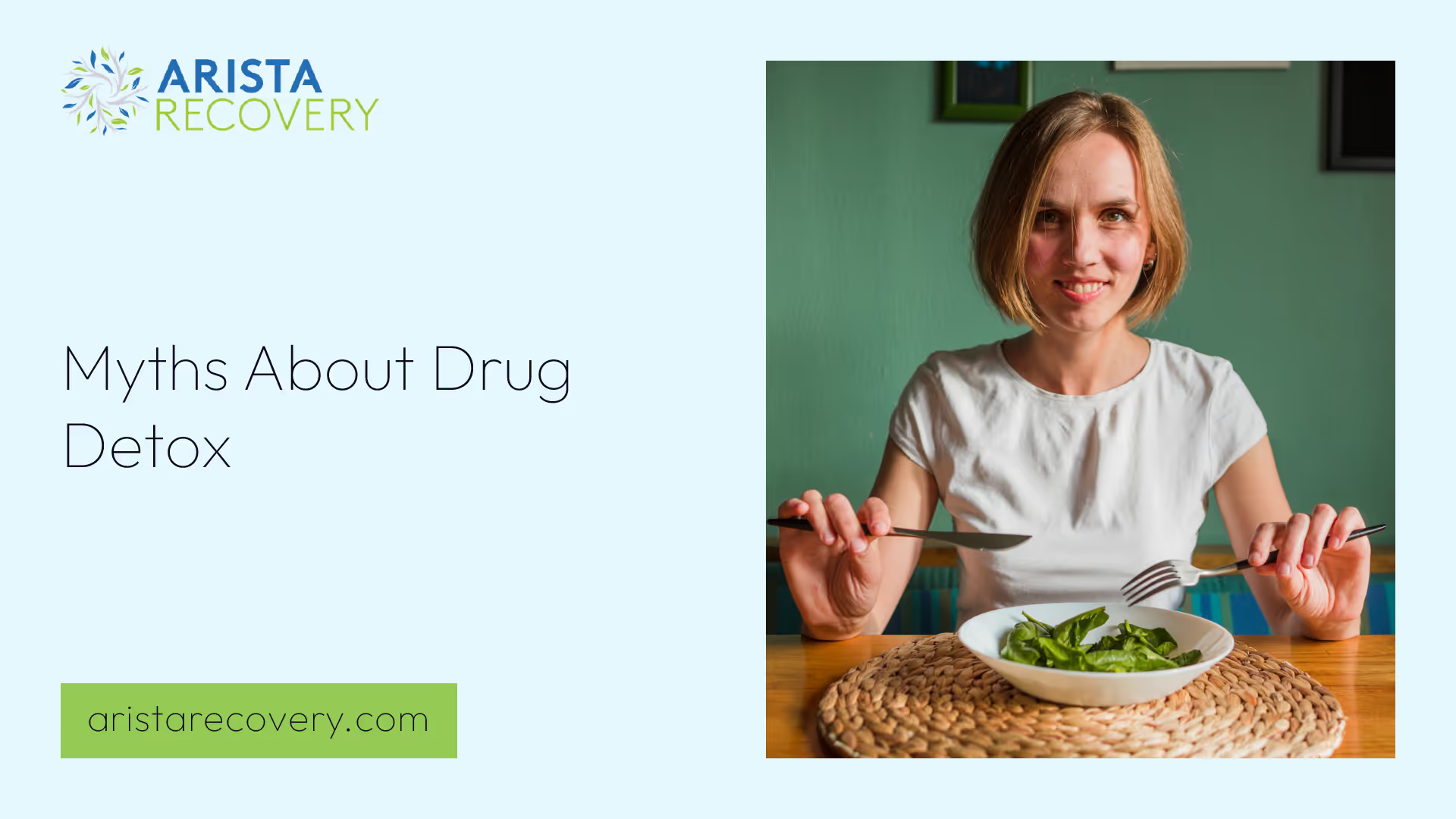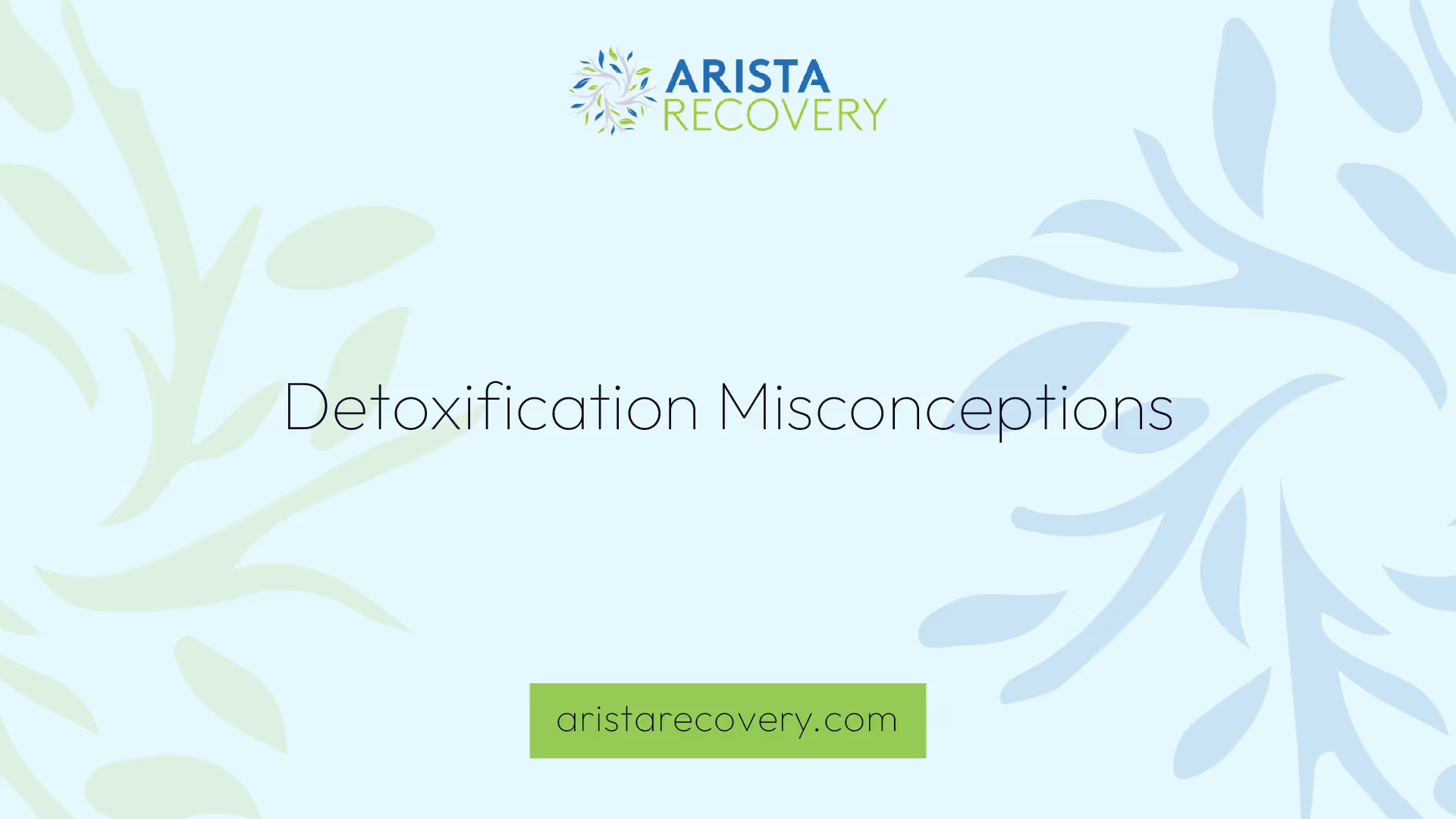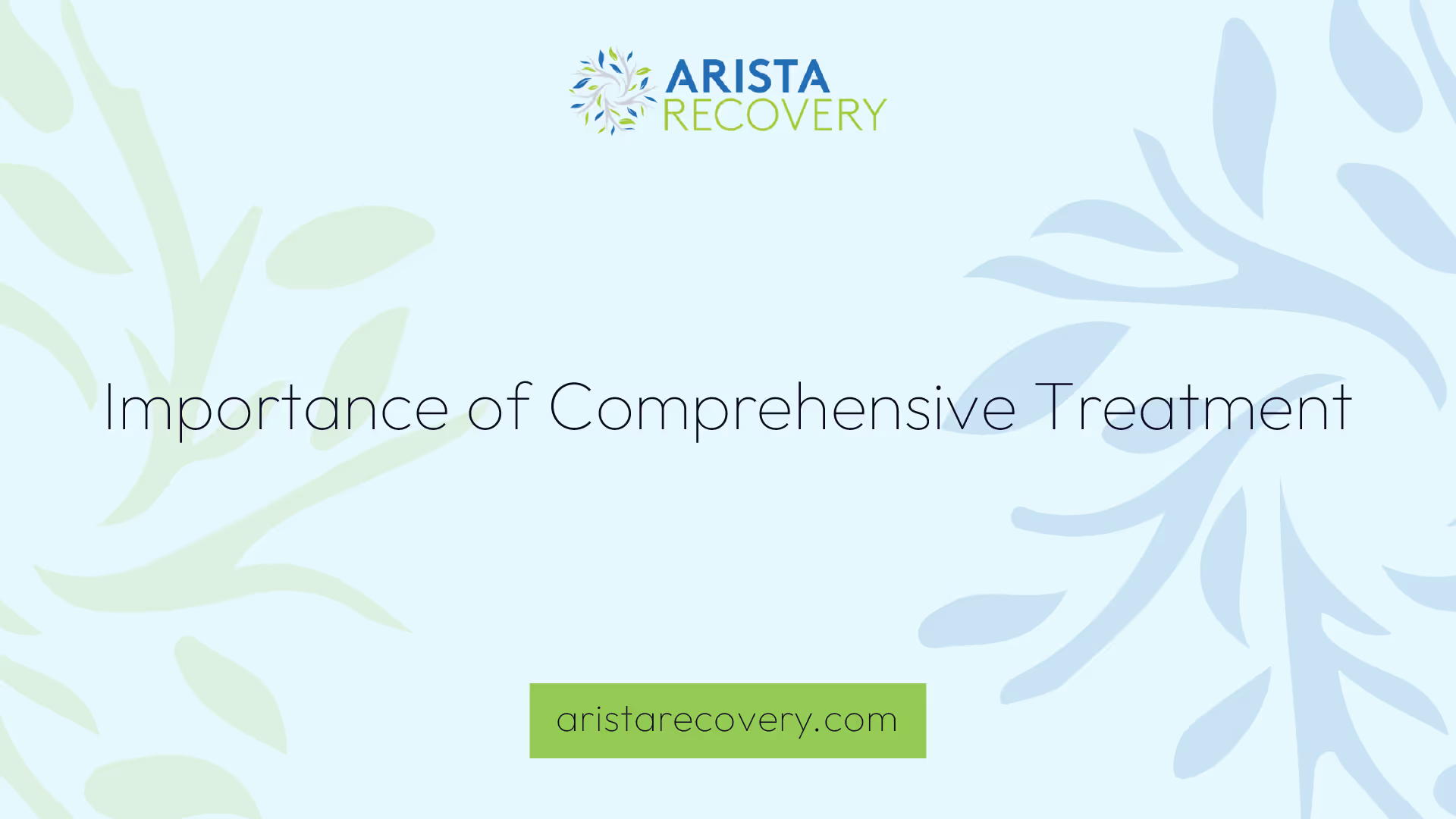Myths About Drug Detox


Debunking Addiction Myths
Addressing the misconceptions surrounding addiction is crucial for individuals and families impacted by substance use. Understanding the true nature of addiction can lead to better approaches in seeking and providing care.
Understanding Addiction as a Disease
Addiction is a serious and complex medical condition that causes uncontrollable drug or alcohol use, despite its damaging consequences. It is not caused by a lack of willpower or personal failure; it’s a brain disease that changes how our brains function [1]. Prolonged substance use alters the brain's chemistry, leading to powerful cravings and a compulsion to use, making it increasingly difficult to quit without a treatment program.
Addiction impacts the brain's reward, motivation, and memory circuits. These changes can persist long after substance use has ceased, underscoring the need for comprehensive treatment. Despite the brain alterations, individuals with substance use disorders are not powerless. Counseling, medications, exercise, and other modalities can treat and reverse brain changes caused by substance abuse [3].
Dispelling the Myth of Choice
One of the most pervasive myths about addiction is that it is a choice. No one “chooses” addiction, and developing a chemical dependence on drugs or alcohol isn’t the person’s fault. Addiction makes significant changes to one’s brain chemistry, making it increasingly difficult to quit. Even if a person intends to quit, their body may start to malfunction without the drug.
Societal stigma often paints addiction as a moral failing or a result of poor choices. However, recognizing addiction as a disease helps shift the perspective towards compassion and understanding. Early intervention and treatment are key to managing addiction effectively. For more information on the importance of early intervention, visit our article on the importance of early intervention.
Understanding these myths is the first step in supporting those affected by substance use and ensuring they receive the best care possible. By dispelling these misconceptions, we can foster a more supportive environment for recovery and long-term wellness. For insights into comprehensive treatment, check out our article on top ways to cure your addiction and alcoholism.

Detoxification Misconceptions
Detoxification is a critical first step in the journey to recovery from substance use disorder. However, there are many myths about drug detox that need to be debunked for individuals and families impacted by substance use to receive the best care possible.
The Role of Detox in Addiction Treatment
One common misconception is that detoxification alone can cure addiction. This is a myth. Detox programs are crucial in the recovery process as they provide a safe environment for individuals to manage withdrawal symptoms under medical supervision. These programs help individuals cleanse their bodies of substances and stabilize them physically, preparing them for further treatment and rehabilitation.
Detoxification is not a standalone solution but an essential component of a comprehensive treatment plan. The primary goal of detox is to rid the body of toxins and manage the acute physical symptoms of withdrawal. It is the first step in a long-term recovery process that involves multiple stages of treatment and support.
Detox vs. Root Causes
Another common myth about addiction is that enrolling in detox will cure the addiction. The truth is that detox only rids the body of toxins, but it does not address the root causes of the disorder [1]. Detox is just the beginning; addressing the underlying issues that contribute to addiction requires comprehensive treatment.
Addiction is a chronic illness that requires ongoing management and support. Effective treatment involves a combination of detox, therapy, medication, and social support to address the root causes of addiction and support long-term recovery [4]. Detox alone does not provide the tools or strategies needed to manage the psychological, social, and emotional aspects of addiction.
For more information on comprehensive addiction treatment, visit our article on top ways to cure your addiction and alcoholism.
Understanding the role of detox in addiction treatment and the importance of addressing the root causes is crucial for achieving long-term recovery. For further reading on addiction and its broader impacts, explore our page on addiction: a family disease.
Detoxification is just one piece of the puzzle in the complex process of overcoming substance use disorder. Comprehensive treatment plans that address both the physical and underlying causes of addiction are essential for lasting recovery.

Importance of Comprehensive Treatment
Effective treatment for addiction goes beyond just detoxification. To support long-term recovery, it is essential to address the underlying issues and implement strategies for relapse prevention.
Beyond Detox: Addressing the Underlying Issues
Detoxification is a critical first step in addiction treatment, but it is not sufficient on its own. Addiction is a chronic illness that requires ongoing management and support. Effective treatment involves a combination of detox, therapy, medication, and social support to address the root causes of addiction and support long-term recovery [4].
Key components of comprehensive treatment include:
- Therapy: Individual and group therapy helps patients understand and address the psychological aspects of their addiction. Cognitive-behavioral therapy (CBT) and other therapeutic approaches can be used to modify harmful behaviors and thought patterns.
- Medication-Assisted Treatment (MAT): Maintenance medications like methadone and buprenorphine are effective in managing opioid addiction and reducing the risk of relapse. These medications are essential components of a comprehensive treatment plan and should be used alongside therapy and social support.
- Social Support: Engaging with support groups and building a network of supportive relationships can provide the encouragement and accountability needed for sustained recovery. For more information on the role of therapy and support groups, visit our article on the role of therapy and support groups.
Relapse Prevention and Long-Term Recovery
Achieving and maintaining long-term recovery involves more than just initial detox. It requires addressing complex problems in various aspects of living and preparing patients for the possibility of relapse. Treatment programs have three generalized goals:
- Attainment and Maintenance of Abstinence: The primary goal is to help patients achieve and maintain abstinence from drugs.
- Addressing Complex Problems: Comprehensive treatment addresses issues in multiple areas of a patient's life, including mental health, employment, and relationships.
- Preparing for Relapse: Relapse is a common part of the recovery process. Preparing patients for the possibility of relapse and equipping them with strategies to handle it is crucial.
Evaluations of substance abuse treatment efforts have shown that the majority of substance-dependent patients eventually stop compulsive use and experience fewer and less severe relapse episodes. Almost 90% of those who remain abstinent for 2 years are also drug- and alcohol-free at 10 years [5].
By understanding the importance of comprehensive treatment and implementing strategies for relapse prevention, individuals and families impacted by substance use can receive the best care possible. For more details on effective treatment methods, visit our article on top ways to cure your addiction and alcoholism.
Duration and Impact of Drug Detox
Understanding the duration and impact of drug detoxification is crucial for individuals and families affected by substance use. This section will explore the factors influencing the detox process and the detoxification timeframe for different substances.
Factors Influencing Detox Duration
The duration of drug detox can vary widely based on several factors. These factors include the type of substance used, the length and frequency of use, the severity of use, and the individual's physical dependence. Typically, detoxing from drugs or alcohol takes between 3 to 10 days, but in some cases, it may extend longer depending on medical necessity and individual circumstances [4].
Detox for Different Substances
Different substances impact the detoxification process differently, with detox duration varying significantly depending on the drug in question. Factors such as the drug's half-life, duration of use, and physical dependence influence the detox process. For example, benzodiazepines may take weeks to detox from due to their long half-life.
The duration of drug detox can vary significantly based on the substance involved, the individual's history of use, and their overall health [6]. While some detox processes may be relatively short, others, especially for substances with long-lasting effects on the body, may require a more extended detoxification period.
Different substances require varying lengths of time for detoxification, with some drugs necessitating longer periods due to their effects on the body and brain [7]. Understanding the specific detox needs for each substance is crucial in providing effective treatment and support during the recovery process.
The detox process is influenced by the type of substance being used, the duration and intensity of use, and the individual's overall health. Some substances may require a longer detox period due to their impact on the body and brain. Personalized detox programs tailored to individual needs are essential for a successful recovery journey.
For more information on comprehensive treatment beyond detox, visit our section on top ways to cure your addiction and alcoholism. Additionally, early intervention and support can play a crucial role in recovery, as highlighted in our article on your loved one doesn’t need a formal intervention.
Medication-Assisted Treatment
Medication-Assisted Treatment (MAT) is a crucial component of addiction recovery, particularly when addressing the myths about drug detox. It combines the use of medications with counseling and behavioral therapies to provide a comprehensive approach to treating substance use disorders.
Utilizing Medications in Addiction Recovery
Prescription medications play a significant role in the detoxification process and long-term management of addiction. During detox, medications are utilized to alleviate withdrawal symptoms, improve patient comfort, and reduce the risk of complications. The use of evidence-based medications is carefully assessed by experienced medical staff to ensure safety and effectiveness.
For opioid addiction, medications like methadone and buprenorphine are commonly used. These medications help manage cravings and withdrawal symptoms, making it easier for individuals to focus on their recovery journey. They are essential components of a comprehensive treatment plan and should be used alongside therapy and social support to support long-term recovery.
Benefits of Maintenance Medications
Maintenance medications offer several benefits in managing addiction and reducing the risk of relapse. They are particularly effective for individuals struggling with opioid addiction. Methadone and buprenorphine, for example, work by binding to the same receptors in the brain as opioids, helping to alleviate withdrawal symptoms and cravings without producing the same euphoric effects.
Figures courtesy Samba Recovery
Maintenance medications also contribute to the overall stability of individuals in recovery. By reducing the physical dependency on opioids, these medications enable individuals to engage more effectively in counseling and behavioral therapies. This holistic approach addresses the psychological and social aspects of addiction, promoting a higher likelihood of sustained recovery.
For more information on how medication-assisted treatment integrates into a broader recovery strategy, visit our article on top ways to cure your addiction and alcoholism.
In addition to methadone and buprenorphine, other medications like naltrexone are used to manage both alcohol and opioid addiction. Naltrexone works by blocking the euphoric effects of these substances, reducing the incentive to use them.
To support individuals and families impacted by substance use, it is essential to understand the role of medication-assisted treatment in addiction recovery. By combining medications with therapy and support groups, individuals can achieve long-term recovery and improve their quality of life. For additional resources and support, consider exploring the role of therapy and support groups.
Seeking Help and Support
When addressing substance use disorders, seeking help and support is vital for recovery. This section explores the importance of early intervention and the role of therapy and support groups in the journey towards long-term recovery.
Importance of Early Intervention
Early intervention can significantly improve the chances of successful recovery from substance use disorders. The earlier an individual seeks treatment, the better the outcomes, as prolonged substance use can make the disorder more challenging to treat. Intervening early can prevent the escalation of the addiction and reduce the risk of severe health complications.
Numerous studies have shown that treatment can be effective even if it is not voluntary. Individuals who enter treatment due to pressure from family, employers, or the legal system can benefit as much as those who seek help voluntarily [2]. The key is to start the recovery process as soon as possible, regardless of the circumstances. For more information on early intervention, visit your loved one doesn’t need a formal intervention.
Role of Therapy and Support Groups
Therapy and support groups play a crucial role in treating substance use disorders. These approaches address the underlying issues and provide individuals with the tools and support needed for long-term recovery. Substance Use Disorder (SUD) is brain-based and can be treated through various methods, including therapy, medication, and lifestyle changes.
Therapy helps individuals understand the root causes of their addiction and develop coping strategies to manage triggers and cravings. Cognitive-behavioral therapy (CBT), for example, is effective in changing negative thought patterns and behaviors associated with substance use.
Support groups, such as Alcoholics Anonymous (AA) or Narcotics Anonymous (NA), provide a sense of community and shared experience. These groups offer a safe space for individuals to share their struggles and successes, fostering a sense of belonging and accountability. Participating in support groups can reduce feelings of isolation and provide encouragement from others who understand the challenges of recovery.
Long-term recovery requires a personal commitment to change and adherence to the treatment plan. Patients who remain in treatment for longer periods are more likely to achieve successful outcomes. A treatment episode lasting three months or longer often predicts a higher chance of long-term recovery [5].
For more insights into effective treatment methods, visit top ways to cure your addiction and alcoholism.
By seeking help early and engaging in therapy and support groups, individuals and families impacted by substance use can work towards a healthier, addiction-free life. For further reading on how addiction affects families, see addiction: a family disease.
References
[1]: https://www.serenitygrove.com/news/common-myths-about-addiction/
[3]: https://wishrehab.com/blog/debunking-myths-about-drug-addiction
[4]: https://www.sambarecovery.com/rehab-blog/myths-about-drug-detox
[5]: https://www.ncbi.nlm.nih.gov/books/NBK64815/
[6]: https://scottsdaleazdetox.com/drug-and-alcohol-detox/related/debunking-common-myths-about-drug-and-alcohol-detox/
[7]: https://www.newhorizonscentersoh.org/blog/myths-about-drug-detox
You’re not alone in this.
When mental health challenges and addiction intersect, it can feel isolating. At Arista, we offer compassionate, evidence-based, and trauma-informed care to help you heal, grow, and move forward.
You’re not alone in this.
When mental health challenges and addiction intersect, it can feel isolating. At Arista, we offer compassionate, evidence-based, and trauma-informed care to help you heal, grow, and move forward.
Support that moves with you.
You’ve taken a brave first step. At Arista Recovery, we’re here to help you continue with best-in-class care designed for long-term healing and support.
.webp)






